
Featured Blog | This community-written post highlights the best of what the game industry has to offer. Read more like it on the Game Developer Blogs or learn how to Submit Your Own Blog Post
Video Game Composers and the Importance of Research: The Music of Sports Scramble
Game composer Winifred Phillips discusses the role of music research in the game music composition process, from the context of her work composing the music for the Sports Scramble VR game from Armature Studio. Article includes video examples.

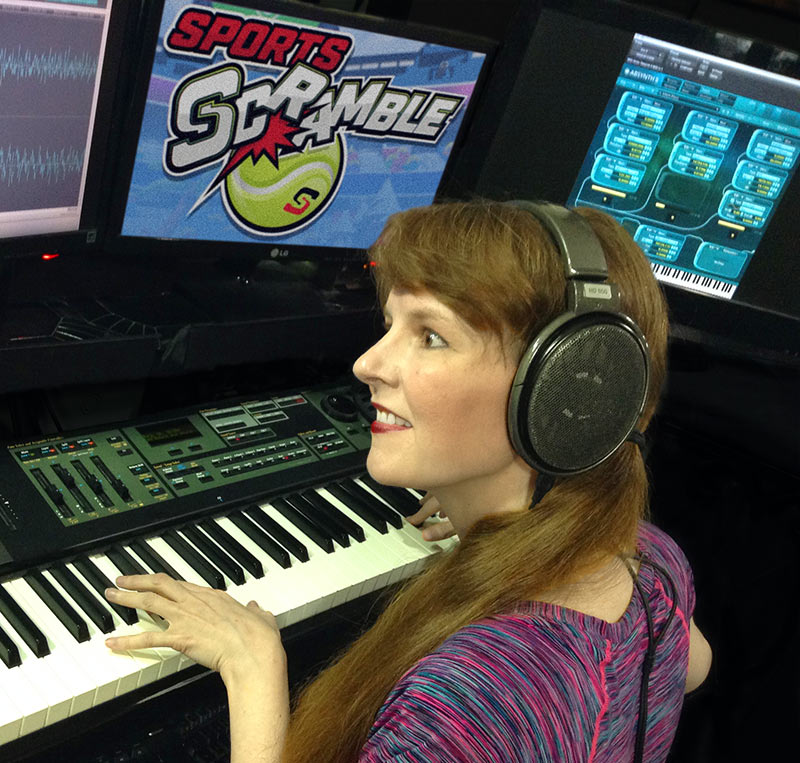
By Winifred Phillips | Contact | Follow
Hey, everybody! I'm videogame composer Winifred Phillips. As game composers, it's inevitable that we'll eventually be asked to create music in a genre with which we have little or no experience. Some projects may throw several unfamiliar musical genres our way. It can be a scary prospect. I've worked on many projects that have required me to quickly learn new musical styles and techniques, so I thought I'd share some thoughts about how research can help us cope with these sorts of unexpected demands. This article will explore the role of music research, including how it can initiate us into the mysteries of unfamiliar musical styles, and ways in which it can lead us in unanticipated (but not unwelcome) directions. I've had lots of experience delving into diverse musical genres and doing music research for projects both big and small over the course of my career. For this article, I'll be describing my recent experience composing the music for the Sports Scramble VR game, developed by Armature Studio and released earlier this year for popular VR platforms such as the Oculus Quest and the Oculus Rift/Rift S.
Sports Scramble
Sports Scramble is a fun and wacky VR party game designed to intentionally challenge expectations by combining oddball items with well-known sports. Players can knock down bowling pins with a pineapple, or return a tennis volley using a golf club. The game scrambles the equipment and the playing field suddenly without notice, resulting in fresh challenges and lots of humorous situations. Players can then challenge each other in multiplayer, where the best players ascend to the top of the leaderboard. Here's the trailer for Sports Scramble, featuring the main theme music I composed for the game:
Since the gameplay of Sports Scramble was designed to be surprising, the developers at Armature Studio decided that the music should follow suit. Between tennis serves, players would hear the type of jaunty organ music that usually serenades baseball fans. 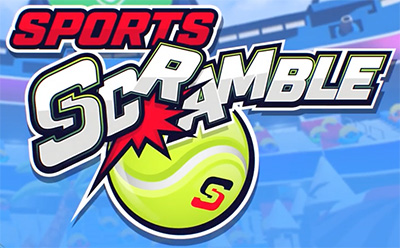 Likewise, the music heard during a baseball game would feel more appropriate for the NBA than the MLB. And in the case of the bowling games, hearing any music at all would come as a big surprise, so musical style could go in a hundred different directions. Whatever those choices might be, the final result had to incorporate unexpected and humorously scrambled music choices that would perfectly echo the central theme in the game. I was excited to compose music that would be so unexpected. However, I didn't consider myself a sports music expert. For instance, I'd never composed baseball organ music. I had no idea what music would be suitable for bowling. Plus, I'd heard a pretty wide variety of sports jams at NBA games, so trying to find an appropriately evocative musical approach seemed like it could be challenging. So let's take these issues one at a time - starting with the NBA sports music conundrum.
Likewise, the music heard during a baseball game would feel more appropriate for the NBA than the MLB. And in the case of the bowling games, hearing any music at all would come as a big surprise, so musical style could go in a hundred different directions. Whatever those choices might be, the final result had to incorporate unexpected and humorously scrambled music choices that would perfectly echo the central theme in the game. I was excited to compose music that would be so unexpected. However, I didn't consider myself a sports music expert. For instance, I'd never composed baseball organ music. I had no idea what music would be suitable for bowling. Plus, I'd heard a pretty wide variety of sports jams at NBA games, so trying to find an appropriately evocative musical approach seemed like it could be challenging. So let's take these issues one at a time - starting with the NBA sports music conundrum.
Space Jam
When I began work on the music inspired by NBA games, I spent a lot of time digging through web sites and playlists, doing music research. As game composers, when we're doing this kind of research, we should try to remember that patience can be the key to our success. We should try to go slowly, and keep an open mind. In the beginning, I started with the most obvious sports music associated with the NBA - Space Jam, by Quad City DJ's. This track was the opening music for the film of the same name, in which NBA star Michael Jordan saves the famous Looney Tunes characters by participating in an awesome interstellar basketball game. Here's how that music appeared in the Space Jam movie (track starts at 0:40):
While this music definitely encapsulates the pumping energy and attitude of an NBA sports anthem, I came away with the impression that the overall style wasn't right for Sports Scramble. The Quad City DJ's track relies heavily on rap lyrics, and a rap vocal would have been too intrusive for my work on the Sports Scramble game. Plus, the overall texture of the Space Jam track felt a little too dark and heavy. I needed a lighter quality to go with the humor and unpredictability of the Sports Scramble project. So, that meant that the style of Space Jam was all wrong. While this conclusion might have been discouraging, it actually opened up another interesting avenue.
C'mon N' Ride It
In my initial research on Space Jam, I came across a great article in Spin Magazine about the Quad City DJ's and their work on the Space Jam soundtrack. The article discussed the history of this successful Southern hip hop act, and cited several of their other hit recordings. One of these grabbed my attention. It wasn't right for the NBA-inspired music that I'd been asked to deliver for the baseball gameplay in Sports Scramble, but there was something in the track that tugged at the corners of my mind. During my research, I kept coming back to it -- Quad City DJ's C'mon N' Ride It (The Train).
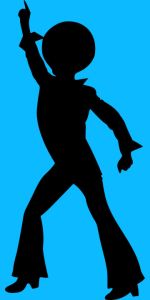 As we heard, disco heritage permeates C'mon N' Ride It (The Train). The track has been associated with diverse sports such as basketball, football, and ice hockey, so it seemed to me that the disco feel could work for a sports video game. I'd composed disco-inspired tracks for previous projects, including the Speed Racer video game for Warner Bros. Working with disco flavor and instrumentation was always pretty inspiring for me. While disco didn't feel right for the NBA-inspired portions of Sports Scramble... it might work for the bowling gameplay.
As we heard, disco heritage permeates C'mon N' Ride It (The Train). The track has been associated with diverse sports such as basketball, football, and ice hockey, so it seemed to me that the disco feel could work for a sports video game. I'd composed disco-inspired tracks for previous projects, including the Speed Racer video game for Warner Bros. Working with disco flavor and instrumentation was always pretty inspiring for me. While disco didn't feel right for the NBA-inspired portions of Sports Scramble... it might work for the bowling gameplay.
There really isn't any music used in professional competitive bowling, so there was no musical baseline from which to draw a contrast. I couldn't defy musical expectations in the usual scrambled way that typifies music elsewhere in the game, since no one expects music in a bowling match. As a result, I had pretty wide latitude to make artistic decisions. Initially, I'd been thinking that maybe I would try to whip up something lounge-inspired, to evoke the lounge-like atmosphere in a bowling alley. But now, I had this fun disco vibe stuck in my head. It fit with the retro flavor I'd already been contemplating, but with a higher energy than what the retro-lounge style would have delivered. Plus, it had the chance to be humorous, which fit the tone of the game. Disco bowling? Why not! Here's how my disco-inspired bowling music sounds in the Sports Scramble game:
 As we can see, my research had rendered some fruitful results so far, though not in the direction I'd initially pursued. I still had to figure out the NBA-inspired music that would be implemented in the baseball gameplay. Because of the nature of gameplay, the music would consist of short tracks that would trigger frequently over the course of the game. I knew I needed a lot of variety, but also a distinctive vibe, and I'd been directed to pursue NBA-inspired sports music as the overall style for baseball gameplay. I focused my attention again on the Quad City DJ's release, C'Mon N' Ride It (The Train). As an iconic track from the mid 90s, C'Mon N' Ride It was released as a single from the 1996 album Get On Up and Dance. With that as a starting point, I began widening my research to incorporate dance music from the 90s in a more general sense. This turned out to be a jackpot.
As we can see, my research had rendered some fruitful results so far, though not in the direction I'd initially pursued. I still had to figure out the NBA-inspired music that would be implemented in the baseball gameplay. Because of the nature of gameplay, the music would consist of short tracks that would trigger frequently over the course of the game. I knew I needed a lot of variety, but also a distinctive vibe, and I'd been directed to pursue NBA-inspired sports music as the overall style for baseball gameplay. I focused my attention again on the Quad City DJ's release, C'Mon N' Ride It (The Train). As an iconic track from the mid 90s, C'Mon N' Ride It was released as a single from the 1996 album Get On Up and Dance. With that as a starting point, I began widening my research to incorporate dance music from the 90s in a more general sense. This turned out to be a jackpot.
Everybody Dance Now
So now I traveled into a world of thumping beats, swirling synths and flashing lights. 2 Unlimited, MC Hammer, C+C Music Factory, Rob Base and DJ EZ Rock, Black Box, Snap!, Technotronic, Reel 2 Real... it was an embarrassment of riches in terms of inspiration and ideas. Plus, lots of this same music had taken up permanent positions in the timeless playlist of beloved sports anthems. I soaked myself in 90s EDM, and then started composing my own tracks that would exude a 90s dance flavor, but with enough exaggeration to emphasize the humor of the Sports Scramble game. Here's how some of that music worked during baseball gameplay in the Sports Scramble game:
So now that the music for baseball had been nailed down, time to move on to another challenge.
Take Me Out to the Ball Game
One of my other tasks in conducting research for Sports Scramble was to familiarize myself with the iconic sound of the baseball organ, along with the types of music a baseball organist would play. As a part of my work on Sports Scramble, I would be creating an assortment of short organ tracks that were highly reminiscent of baseball, but would be used during tennis gameplay (in keeping with the scrambled nature of this sports VR game). In order to compose this music, I had to accomplish two important goals. The first was to understand the basic style and energy of a performance by a baseball organist. The second was to emulate the incredibly distinctive sound of the organ itself. For the first task, I studied recordings and videos of baseball organists such as Gary Pressy of the Chicago Cubs. Here's a short video about Gary Pressy's work as a baseball organist:
After having gotten comfortable with the overall vibe of this type of organ music, I turned to the daunting task of emulating the organ sound itself. This took several attempts before it could be successfully accomplished. Since I didn't have access to a vintage 1950s organ such as the one Gary Pressy uses, I had to experiment and combine similar-sounding organs until I'd reached the desired effect. In the end, I used three separate virtual organ instruments - one for the right hand, one for the left hand, and a third for the pedals. I also applied quite a lot of sound shaping and processing in order to achieve this end result:
Conclusion
As we've discussed, research can play a vital role in our work as video game composers. It can be especially helpful for us to dive enthusiastically into research when we're asked to compose in unusual musical genres, or styles with which we may be unfamiliar. The process of conducting this research can be unpredictable and slow, but it almost always yields inspiring results. Thanks for reading!
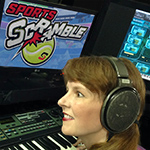 Popular music from composer Winifred Phillips' award-winning Assassin's Creed Liberation score is currently being performed live by a top 80-piece orchestra and choir as part of the Assassin's Creed Symphony World Tour, which kicked off in 2019 with its Paris premiere. As an accomplished video game composer, Phillips is best known for composing music for games in five of the most famous and popular franchises in gaming: Assassin’s Creed, God of War, Total War, The Sims, and LittleBigPlanet. Phillips' other notable projects include music for the triple-A first person shooter Homefront: The Revolution (Deep Silver), and numerous virtual reality games from such accomplished developers as Supermassive Games, High Voltage Software, and Armature Studio. She is the author of the award-winning bestseller A COMPOSER'S GUIDE TO GAME MUSIC, published by the MIT Press. As the foremost authority on music for interactive entertainment, Winifred Phillips has given lectures at the Library of Congress in Washington DC, the Society of Composers and Lyricists, the Game Developers Conference, the Audio Engineering Society, and many more. Phillips’ enthusiastic fans showered her with questions during a Reddit Ask-Me-Anything session that went viral, hit the Reddit front page, received 14.9 thousand upvotes, and became one of the most popular gaming AMAs ever hosted on Reddit.
Popular music from composer Winifred Phillips' award-winning Assassin's Creed Liberation score is currently being performed live by a top 80-piece orchestra and choir as part of the Assassin's Creed Symphony World Tour, which kicked off in 2019 with its Paris premiere. As an accomplished video game composer, Phillips is best known for composing music for games in five of the most famous and popular franchises in gaming: Assassin’s Creed, God of War, Total War, The Sims, and LittleBigPlanet. Phillips' other notable projects include music for the triple-A first person shooter Homefront: The Revolution (Deep Silver), and numerous virtual reality games from such accomplished developers as Supermassive Games, High Voltage Software, and Armature Studio. She is the author of the award-winning bestseller A COMPOSER'S GUIDE TO GAME MUSIC, published by the MIT Press. As the foremost authority on music for interactive entertainment, Winifred Phillips has given lectures at the Library of Congress in Washington DC, the Society of Composers and Lyricists, the Game Developers Conference, the Audio Engineering Society, and many more. Phillips’ enthusiastic fans showered her with questions during a Reddit Ask-Me-Anything session that went viral, hit the Reddit front page, received 14.9 thousand upvotes, and became one of the most popular gaming AMAs ever hosted on Reddit.
Follow her on Twitter @winphillips or visit her website at winifredphillips.com.
Read more about:
Featured BlogsAbout the Author(s)
You May Also Like
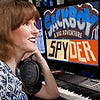
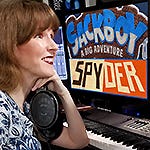





.jpeg?width=700&auto=webp&quality=80&disable=upscale)








